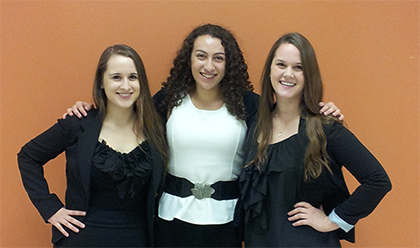Ethics and Bioethics Bowls: Giving students lasting skills and happy memories

Monica Finke, Philomena Panagoulias, and Mary Kate Brueck at the at the 2014 National Undergraduate Bioethics Conference
By Molly Clasen
Loyola’s Ethics and Bioethics Bowl teams offer unique opportunities to gain lifelong skills while having fun and competing across the country. Many students report that the experience improves their reasoning and oral presentation abilities more than any other class or extra-curricular activity at Loyola. From making stronger arguments to thinking more critically about social justice issues, there is no limit to how team members grow as academics and young professionals.
What are Bioethics Bowl and Ethics Bowl?
Combining intellectual rigor with the thrill of competition, Ethics and Bioethics Bowl teams participate in discussions about pressing social issues. Over twenty teams compete at regional competitions,, and thirty-two teams compete at the national level. Each team presents a case that poses an ethical dilemma. Bioethics Bowl cases focus specifically on health care related topics, while Ethics Bowl cases cover a broader scope of topics, including medical, journalism, public policy, military, and environmental issues. Teams respond to questions about arguments presented and comment on other teams’ cases, fostering a lively atmosphere for thoughtful exchanges. “I expected something very formal, like debate, when I joined,” said one undergraduate Bioethics Bowl member. “But the presentations are much more conversational, because you don't know in advance what questions others will ask. This is one of my favorite elements of the competition.”
Loyola’s teams have a successful history of competing. Faculty advisor and co-coach Dr. Jennifer Parks thinks our students make especially sophisticated arguments. “Our teams have excelled because instead of developing arguments that they think will be popular with judges, they develop nuanced approaches that reflect their actual viewpoints.” This strength has led to Loyola's success in both Ethics Bowl and Bioethics Bowl, as the teams have repeatedly placed at both the regional and national levels.
Gaining Lifelong Skills, Values, and Community
Bioethics and Ethics Bowl teams cultivate skills such as the ability to make strong arguments and perform in high-pressure situations. “These skills have served many of our team members who have moved on to careers in law, medicine, and academia,” says Dr. Parks. “One student has even become an Ethics Officer for Chicago Public Schools!” Mary Kate Brueck, who has gone on to a Ph.D. program in philosophy and bioethics at Georgetown University notes: “I am now able to determine the best method for approaching complicated issues.”
The cooperation essential to succeeding at Bioethics Bowls and Ethics Bowls creates a strong sense of community. “Students can only succeed when they all work together,” says Dr. Parks. “As a result of that collaboration, they make long lasting friendships. These friendships extend to other teams as well. Our teams have made friends with other team members from across the country.” Ethics Bowl and Bioethics Bowl teams have travelled all over the United States—from San Antonio, Texas to Tallahassee, Florida, to Washington D.C.—with all expenses paid by the university. “Those trips are great bonding experiences,” says Dr. Parks.
Bioethics Bowl and Ethics Bowl help students situate their opinions about social justice issues within an existing academic framework. “I always tell people that they don't need to come in with a strong background in ethics,” says one participant. “When I first joined Ethics Bowl, I knew hardly anything about the major ethical theories, but my participation on the team gave me so much knowledge.” Many team members find that their fascination with a topic deepens as they immerse themselves in research. “I am surprised by how much the cases draw me in,” another student reflects. “I never expected it to be my favorite activity on campus, but it is.”
Bioethics and Ethics Bowl teams offer students an exciting way to participate in the Loyola community. They cultivate lasting skills that translate to the classroom, the workplace, and beyond. If you are interested in joining the Bioethics or Ethics Bowl Teams, please contact Dr. Jennifer Parks at jparks1@luc.edu. You may be surprised by how quickly you want to be involved. According to Dr. Parks, “Once students come to practices or experience a competition, they’re usually hooked!”
